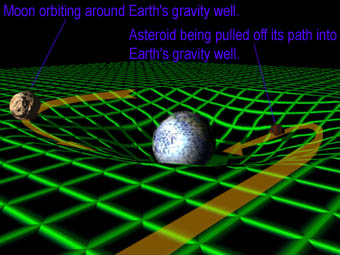Jim of WVa
New member
Just curious but why would size matter in this regard? A speck of dust "warps" the space around it the same way Jupiter does, just on a smaller scale, does it not? (And I would assume this applies to "dark matter" too.) Correct me if I'm wrong but basically all matter puts out an electromagnetic field and therefore exerts a gravitational effect on surrounding matter (and vice versa). For instance, our bodies have an electromagnetic field that exerts a gravitational pull on the Earth, but the Earth has one also and, being larger, it overwhelms the one our bodies put out. But nonetheless, our bodies exert a gravitational pull on surrounding matter the same as a speck of dust or a planet or a can of beans, yada yada yada.
In effect matter, regardless of size, warps the surrounding space to some degree. Here are some examples of what I mean. Notice the moon is warping the space it sits in the same way the earth does.



So, again, my question is, unless you're a debauched queen, why does size matter? :daniel_new004:
Matter without any mass would not warp the space around it. A photon does not warp the space around it because it does not have mass.
